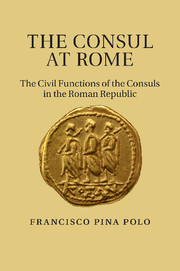Book contents
- Frontmatter
- Contents
- List of illustrations
- Acknowledgements
- Introduction
- PART I THE CONSULAR FUNCTIONS IN THE PRE-SULLAN AGE (367–81)
- 1 The consuls taking office
- 2 Consuls and civic religion
- 3 Consuls, the agents of diplomacy in the Roman state
- 4 Communication between the consuls and the people: edicts and contiones
- 5 Consuls as legislators
- 6 The jurisdiction of the consuls
- 7 Consuls as promoters of public works
- 8 Colonization and distribution of land
- 9 Appointment of a dictator
- 10 Consuls presiding over elections
- 11 The consular year in the pre-Sullan age
- PART II THE CONSULAR FUNCTIONS IN THE POST-SULLAN AGE (80–50)
- 15 Conclusion
- Bibliography
- Index of Subjects
- Index of Ancient Sources
- Index of Ancient Personal Names
8 - Colonization and distribution of land
Published online by Cambridge University Press: 25 October 2011
- Frontmatter
- Contents
- List of illustrations
- Acknowledgements
- Introduction
- PART I THE CONSULAR FUNCTIONS IN THE PRE-SULLAN AGE (367–81)
- 1 The consuls taking office
- 2 Consuls and civic religion
- 3 Consuls, the agents of diplomacy in the Roman state
- 4 Communication between the consuls and the people: edicts and contiones
- 5 Consuls as legislators
- 6 The jurisdiction of the consuls
- 7 Consuls as promoters of public works
- 8 Colonization and distribution of land
- 9 Appointment of a dictator
- 10 Consuls presiding over elections
- 11 The consular year in the pre-Sullan age
- PART II THE CONSULAR FUNCTIONS IN THE POST-SULLAN AGE (80–50)
- 15 Conclusion
- Bibliography
- Index of Subjects
- Index of Ancient Sources
- Index of Ancient Personal Names
Summary
In the pre-Sullan period the consuls, always under orders from the senate and depending on the circumstances, played a more or less leading role in the control of public land (ager publicus) and its possible distribution amongst colonists, either individually or for the foundation of Roman or Latin colonies. Since they were the supreme magistrates, supervision of the use of the land owned by the Roman state also justified consular intervention in the creation of fora on the roads the consuls promoted in Italy.
CONTROL OF THE AGER PUBLICUS AND DISTRIBUTION OF LAND
On several occasions and in different contexts, ancient sources mention that the consuls were responsible for controlling the use and limits of the ager publicus or of carrying out the distribution of public land. In the first case, we have information from Livy regarding the problems of misappropriation of public land in Campania in the first quarter of the second century. In 173, the two consuls were allotted Liguria as their province. However, the senate decided that one of them, L. Postumius, should travel to Campania to establish the precise boundary between the public and private land. Livy adds that it was common knowledge that some persons had unlawfully appropriated public land by the simple process of moving the borders of their plots and invading the ager publicus. Postumius' mission was to recover for the Roman state the land thus lost.
- Type
- Chapter
- Information
- The Consul at RomeThe Civil Functions of the Consuls in the Roman Republic, pp. 169 - 187Publisher: Cambridge University PressPrint publication year: 2011



